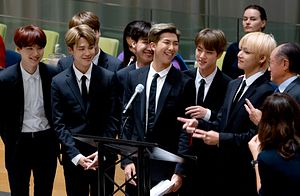Last week, a Japanese TV show announced it was cancelling an appearance by K-pop megagroup BTS, citing an incident last year where one of the group’s members wore a t-shirt celebrating Korean Independence Day that also included the image of an atomic bomb explosion. Amid growing backlash, the group’s management sent out an apology this week, saying they would be reaching out to affected groups, including associations of atomic bomb survivors, to apologize directly.
Many have pointed out that it was odd for the TV station to take issue with the shirt now, when it had originally been worn and reported on last year, and have suggested that BTS has simply been caught in the middle of growing tension between Seoul and Tokyo. In fact, the dispute marks a new low in relations between South Korea and Japan, which has taken a turn for the worse in recent weeks. While far from rosy, relations had been relatively good over the last year or so, especially compared to low points in 2012-13.
But trouble had been brewing under the surface from Korean President Moon Jae-in’s declaration that he was rethinking Seoul’s commitment to the Reconciliation and Healing Foundation, an organization created under the 2015 South Korea-Japan agreement on issues related to Japan’s use of wartime sex slaves, euphemistically known as “comfort women.” The organization “failed to function properly due to objections from the comfort women survivors and South Korean public,” Moon reportedly told Japanese Prime Minister Shinzo Abe during a summit meeting in September.
Two back-to-back incidents further deepened the rift between Seoul and Tokyo — first, Japan withdrew from an international naval fleet review after Korea asked them not to fly the controversial “rising sun” flag that was used by Imperial Japan. Then a Korean court ruled in favor of four Korean workers who were forced to work for a Japanese company during World War II, ordering Nippon Steel & Sumitomo Metal Corporation to pay 100 million won ($88,740) to each of the four plaintiffs (three of whom passed away before the final ruling came down). The ruling now opens the door to other lawsuits against Japanese companies, some of which are now pending.
According to the Asan Institute’s latest survey from June this year, approval of Japan among South Korean respondents has held steady at around 3.5 out of 10 for the last two years, and approval for Abe specifically has hovered around 2 during that time. These low numbers are actually relatively high – as recently as 2015 approval ratings for Japan was below 3 out of 10, with a low point of 2.3 in early 2018. At that time, approval for Abe was just 0.99 out of 10. Unfortunately, the June numbers don’t reflect opinions after these latest spats.
The South Korean entertainment industry has gotten caught in the middle of international relations spats before, most notably during the 2016-17 dispute between South Korea and China over installing the U.S. THAAD missile defense system in South Korea. Korean pop culture has also become a battleground for South Korea-Japan relations in the past, particularly when political tensions are high.
The Japanese right-wing has long been wary of increasing Korean cultural influence in Japan, from publishing a comic titled “Hating the Korean Wave” back in 2005 to staging protests outside of TV stations that aired Korean content. But K-pop stars have also stepped into international disputes before – in 2012, Super Junior member Choi Siwon stirred up controversy among Japanese fans when he retweeted a post from the Blue House supporting Korean ownership over Dokdo, an island also claimed by Japan.
On the other hand, Korean celebrities can also get in trouble for being too friendly toward Japan – in 2016, Girl’s Generation member Tiffany received major backlash after she posted a photo from the group’s Tokyo concert that included an emoji of the rising sun flag over the words “Tokyo, Japan,” marking her location at the time. Not only was the flag imagery offensive to Korean fans, she also happened to post the image on Korea’s Liberation Day, which celebrates Korean independence from Japanese rule. The singer apologized and was later removed from a reality TV show she was participating in at the time.
Japanese BTS fans didn’t seem to be deterred by the latest controversy, showing up in droves for the group’s sold-out show at Tokyo Dome on Tuesday. According to reports, anti-Korean protesters showed up near the venue, but were drowned out by counter-protesters, including those who weren’t necessarily fans of the K-pop group. Fifty-year-old Tanifuji Ritsuko told Yonhap News she showed up to stand up against anti-Korean protestors and to support improved Korea-Japan relations. “BTS came to Japan for a performance and Japanese fans were very happy,” she said. “Korea-Japan relations are in a politically delicate situation, but by sharing happiness and exchanging their thoughts, I hope that young people from the two countries can get along well.”
































